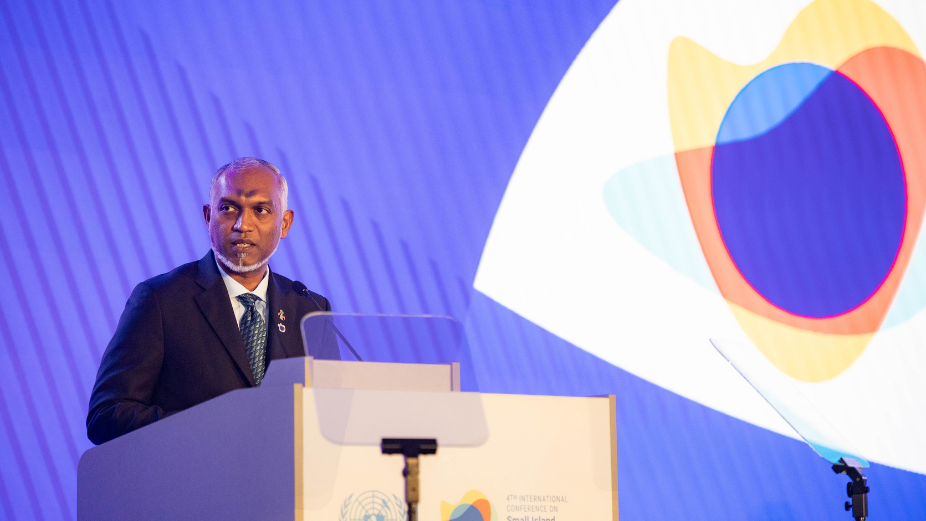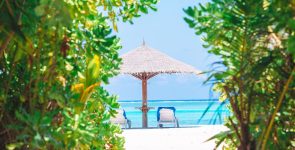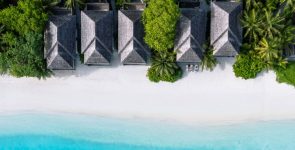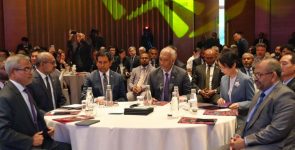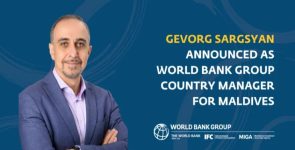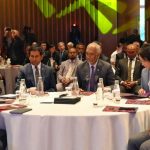At the Fourth International Conference on Small Island Developing States (SIDS4) in Antigua and Barbuda, President Dr Mohamed Muizzu delivered a speech that carried a sense of urgency and a call to action for small island nations.
Dr Muizzu began by expressing solidarity with Papua New Guinea, recently devastated by a landslide, extending condolences to the victims and their families. This introduction set the stage for a speech that swiftly moved to more contentious territory. Addressing the conflict in the Middle East, Dr Muizzu condemned Israel’s defiance of the International Court of Justice’s order and the ongoing violence in Rafah, calling for an immediate halt to what he described as apartheid and genocide.
Drawing a parallel between the plight of Palestine and the challenges faced by small island states, Dr. Muizzu highlighted the shared feelings of helplessness and vulnerability. “As Small Island Developing States, we know all too well the feeling of being helpless. Being vulnerable,” he stated, underscoring a common experience of marginalization on the global stage.
Reflecting on the progress since the first Programme of Action for SIDS in 1994, Dr Muizzu painted a stark picture of persistent poverty, a worsening climate crisis, environmental degradation, rising external debt, and rampant inequality. His critique was direct, yet it carried a message of hope rooted in the resilience of small island nations. “Our vulnerabilities should not be our downfall. They should be our armour. Our rallying call,” he declared.
Dr Muizzu proposed three key measures to harness this potential. First, he called for the international community to provide SIDS with credit enhancement measures and reduce borrowing costs. He advocated for innovative financing solutions and greater ambition in climate finance, stressing the inadequacies of current global climate funds.
Second, he urged the UN system, global development institutions, and private sector financiers to adopt a synergistic approach to support SIDS. Citing the Antigua and Barbuda Agenda for SIDS, which the Maldives helped formulate, Dr Muizzu emphasized the need for coordinated international action and questioned the effectiveness of ten-year programmes, suggesting a more responsive five-year cycle.
Finally, Dr Muizzu called for SIDS to lead their development journey. He highlighted the importance of investing in state and productive capacities, leveraging the private sector, and improving transparency and accountability in public service delivery. His vision for the Maldives was embodied in the ambitious Ras Malé project—a new eco-city designed to address the housing crisis, achieve net-zero emissions, and serve as a model of digital and transportation connectivity.
Concluding his speech, Dr Muizzu emphasized the need for small island nations to assert their place in the global arena. “SIDS can, and SIDS must lead!” he declared, urging collective action and resilience. His vision for the future was one where small island nations shape their destinies despite their size, making choices today to protect a world as interconnected and beautiful as the islands themselves.
Dr Muizzu’s address at SIDS4 was a stark reminder that the voices of small island nations must be heard and acted upon. His call for justice, resilience, and proactive leadership resonated as a powerful manifesto for these vulnerable yet determined nations.

